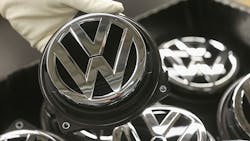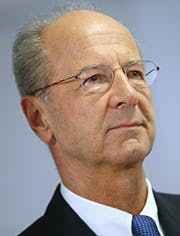VW Woes Deepen as Prosecutors Extend Probe to Chairman
Volkswagen AG’s troubles deepened as supervisory board Chairman Hans Dieter Poetsch was added to a German probe of the company’s emissions scandal and a newspaper reported that U.S. testers found software to cheat air-quality tests in Audi cars this summer.
The carmaker on Sunday said public prosecutors in Braunschweig, near its Wolfsburg headquarters, extended its investigation for alleged market manipulation to Poetsch, who becomes the second current board member to be targeted. Poetsch and VW are supporting the inquiry, which relates to his time as chief financial officer, the company said in a statement.
Management “fulfilled its disclosure obligation under German capital markets law,” Volkswagen (IW 1000/8) said. A representative of the company’s largest shareholder, Porsche Automobil Holding SE, voiced support for Poetsch.
The disclosure is the latest dose of bad news for Europe’s largest automaker as it struggles to emerge from a scandal over software designed to cheat on emissions tests. The scandal cost former Volkswagen CEO Martin Winterkorn his job, spurred criminal investigations and hundreds of lawsuits, and sliced about 14 billion euros (US$15.5 billion) from VW’s market value. The stock today was little changed at 118.65 euros in Frankfurt trading.
Germany’s biggest carmaker admitted last year to systematically rigging emissions tests for diesel vehicles, exposing it to fines and other costs that have so far led to provisions totaling 18.2 billion euros. Volkswagen has hired U.S. law firm Jones Day to investigate the emissions affair, which has also led to the departures of Audi development chiefs Stefan Knirsch and Ulrich Hackenberg.
While Volkswagen has settled civil penalties in the U.S. related to rigged 2.0-liter diesel cars and is recalling those vehicles in Europe, issues related to larger 3.0-liter motors remain unresolved, even if a judge last week said substantial progress in talks have been made. The discussions relate to about 80,000 cars with diesel engines developed by Audi. By secretly adjusting how cars performed under test conditions versus on the road, Volkswagen was able to market diesel engines’ efficiency while not sacrificing driving performance.
Poetsch was CFO of Volkswagen from 2003 to 2015 and also sits on the supervisory boards of the company’s Porsche and Audi units. The market-manipulation investigation by Braunschweig prosecutors is also targeting Winterkorn and VW brand chief Herbert Diess over how they disclosed the scandal to investors.
A spokeswoman for the state government of Lower Saxony, where the company is based, said it won’t take a position on the latest investigation as it is a matter for the prosecutor and courts to handle.
The Porsche and Piech families, which control 52% of VW’s voting stock, backed the chairman. Wolfgang Porsche, the billionaire clan’s top representative on VW’s supervisory board, said in an e-mailed statement that “the Porsche and Piech families absolutely stand behind Mr. Poetsch.” The families continue to share VW’s view that the company has complied with disclosure rules, he said.
The state of Lower Saxony is the automaker’s second-largest shareholder with a 20% stake, followed by Qatar with 17%. VW’s preferred stock, its most widely traded, doesn’t carry voting rights.
California Eyes Audis
Volkswagen is also running into more potential trouble in the U.S. environmental authorities in California discovered certain Audi gasoline and diesel models with automatic transmissions that included software that would burn less fuel and emit less carbon-dioxide when on the test stand than while driven on the roads, according to Germany’s Bild am Sonntag newspaper. The findings made over the summer apply to cars including the Audi A6 and A8 and its Q5 SUV, the newspaper said. Audi had stopped installing the defeat devices in new vehicles by that time, Bild said.
Environmental authorities discovered that when the steering wheel of those vehicles was turned more than 15 degrees, as if backing out of a parking space, the emissions-limiting software disengaged, Bild reported. An Audi spokesman declined to comment on the Bild report, citing ongoing negotiations with authorities.
By Aaron Ricadela and Christoph Rauwald
About the Author
Bloomberg
Licensed content from Bloomberg, copyright 2016.

